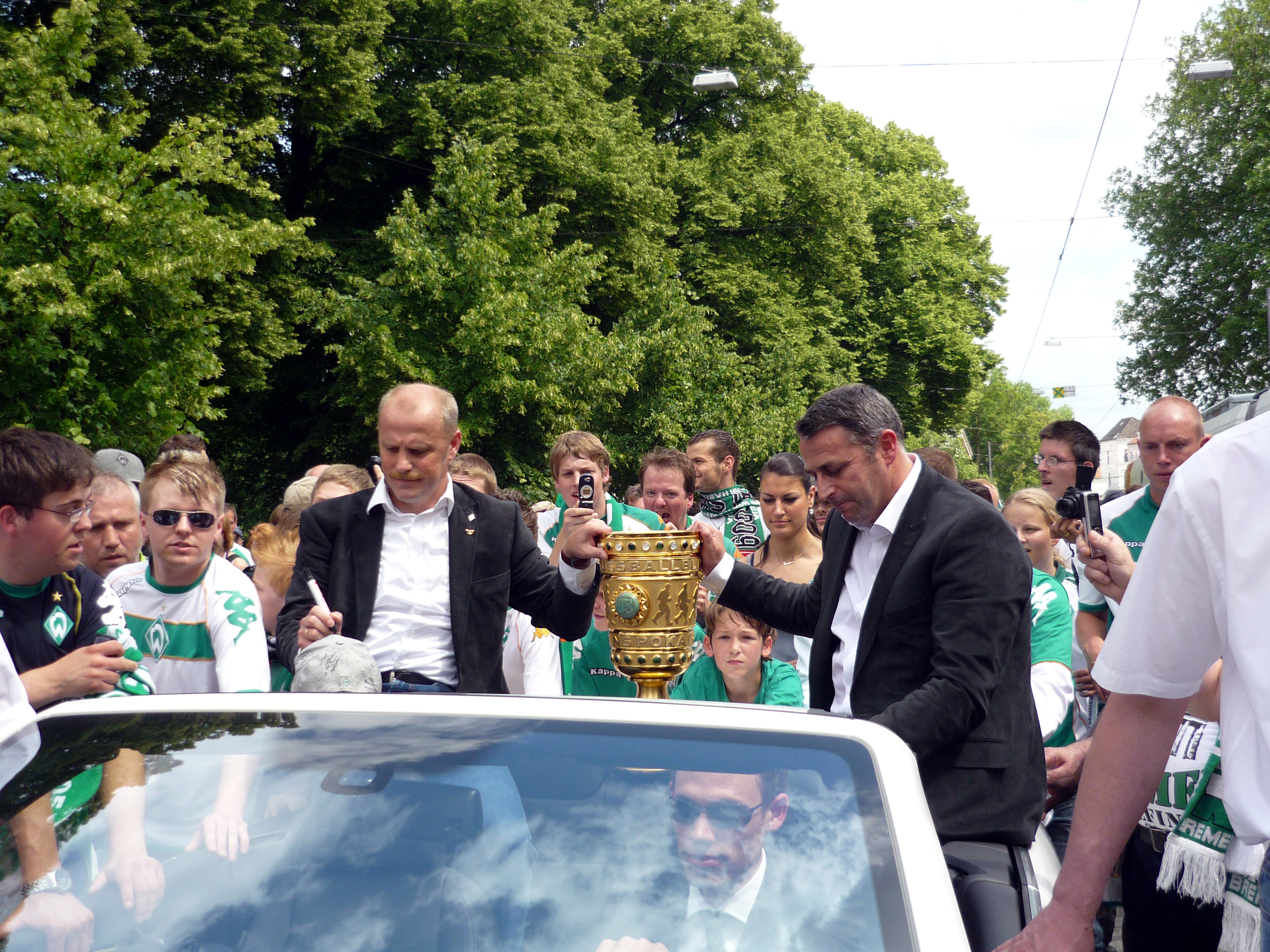|
Karlheinz Förster
Karlheinz Helmut Förster (born 25 July 1958) is a German former professional footballer who played as a central defender. The younger brother of another football defender, Bernd Förster, he was regarded as one of the world's top man-markers at his peak, and played most of his career at VfB Stuttgart with Bernd. Both were crowned European champions in 1980. Club career Born in Mosbach, Förster started playing professionally at VfB Stuttgart, which would be his only club in the German first division. He was instrumental in the club's promotion in 1977, as he scored five times in 34 contests. In the topflight, Förster rarely missed a game, partnering sibling Bernd in the backline. Both were instrumental in the club's 1983–84 league conquest and he left the club in 1986, having played in more than 300 overall official matches. He was then bought by France's Olympique de Marseille, for 3.5 million Deutsche Mark. In his third year with ''L'OM'', already partnered by countr ... [...More Info...] [...Related Items...] OR: [Wikipedia] [Google] [Baidu] |
Mosbach
Mosbach (; South Franconian: ''Mossbach'') is a town in the north of Baden-Württemberg, Germany. It is the seat of the Neckar-Odenwald district and has a population of approximately 25,000 distributed in six boroughs: Mosbach Town, Lohrbach, Neckarelz, Diedesheim, Sattelbach and Reichenbuch. Geography Located about 35 km east of Heidelberg, it is situated south of the Odenwald mountains at a height of 134-354m at the confluence of the Neckar and the Elz. The town is part of the conservation area Naturpark Neckartal-Odenwald and the UNESCO ''Geopark Bergstraße-Odenwald''. History The settlement of Mosbach developed around the Benedictine monastery of Mosbach Abbey (''"Monasterium Mosabach"''), the first written record of which dates from the 9th century. In 1241 rights and privileges had been granted to Mosbach as an Imperial free city. These rights were lost in 1362 when Mosbach became part of the Electorate of the Palatinate. With the division of the lands of King Ru ... [...More Info...] [...Related Items...] OR: [Wikipedia] [Google] [Baidu] |
UEFA European Football Championship
The UEFA European Football Championship, less formally the European Championship and informally the Euro, is the primary association football tournament organised by the Union of European Football Associations (UEFA). The competition is contested by UEFA members' senior men's national teams, determining the continental champion of Europe. It is the second-most watched football tournament in the world after the FIFA World Cup. The Euro 2012 final was watched by a global audience of around 300 million. The competition has been held every four years since 1960, except for 2020, when it was postponed until 2021 due to the COVID-19 pandemic in Europe, but kept the name Euro 2020. Scheduled to be in the even-numbered year between FIFA World Cup tournaments, it was originally called the European Nations' Cup, changing to the current name in 1968. Since 1996, the individual events have been branded as "UEFA Euro ear''". Before entering the tournament, all teams other than the host ... [...More Info...] [...Related Items...] OR: [Wikipedia] [Google] [Baidu] |
Fritz Walter
Friedrich "Fritz" Walter (, ; 31 October 1920 – 17 June 2002) was a German footballer who spent his entire senior career at 1. FC Kaiserslautern. He usually played as an attacking midfielder or inside forward. In his time with the Germany and West Germany national teams, he appeared in 61 games and scored 33 goals, and was the captain of the team that won the 1954 FIFA World Cup. Life and career Early club career Walter was exposed to football early with his parents working at the 1. FC Kaiserslautern club restaurant. By 1928 he had joined the Kaiserslautern youth academy, and he made his first team debut at 17, continuing an association with the club that would be his only professional club. International pro teams had repeatedly offered him hefty sums, but with support from his wife always declined in order to stay at home, to play for his home town, the national team and "Chef" (German for "boss") Herberger. International debut Walter debuted with the German national ... [...More Info...] [...Related Items...] OR: [Wikipedia] [Google] [Baidu] |
Ottmar Walter
Ottmar Kurt Herrmann Walter (6 March 1924 – 16 June 2013) was a German footballer who played as a striker. He played together with his brother, Fritz Walter, at the club 1. FC Kaiserslautern. They also played together for the Germany national football team in the 1954 FIFA World Cup. Walter scored four goals in the tournament as West Germany won their first ever World Cup title. In total, Walter earned 20 caps and scored 10 goals for Germany. For his club 1. FC Kaiserslautern he scored an unequaled 336 goals in 321 league and cup matches. Walter debuted in the first team at the age of 18 in 1942 as an outside left in a 7–1 rout of SV Waldhof Mannheim. During World War II, Walter was drafted into the Kriegsmarine and suffered heavy injuries in his right knee. After several operations, he was forced to end his career in 1958. Career Club career Born in Kaiserslautern, Walter and his two brothers Fritz and Ludwig all joined local club, 1. FC Kaiserslautern. After making ... [...More Info...] [...Related Items...] OR: [Wikipedia] [Google] [Baidu] |
Jan Ceulemans
Jan Anna Gumaar Ceulemans (; born 28 February 1957) is a Belgian former professional footballer who played as an attacking midfielder. A prolific goalscorer, Ceulemans was known for his stamina, aerial ability and technique. He was also known for his power, imposing frame and natural authority. He is his country's seventh most capped player with 96 international appearances. Most of his time with Belgium took place under the guidance of Guy Thys. This period saw the Belgium squad record some of their finest results, which include reaching the final of Euro 80 and fourth place at the 1986 FIFA World Cup. Career Ceulemans was born in Lier, Belgium. His first of three World Cup appearances was at the 1982 FIFA World Cup, where Belgium beat the defending champions Argentina 1–0 in the opening game of the tournament at Camp Nou en route to reaching the second round. Among Ceulemans' finest achievements was captaining his national side to fourth place in the 1986 FIFA World Cup, ... [...More Info...] [...Related Items...] OR: [Wikipedia] [Google] [Baidu] |
Belgium National Football Team
The Belgium national football teamfrench: Équipe nationale belge de footballgerman: Belgische Fußballnationalmannschaft officially represents Belgium in men's international football since their maiden match in 1904. The squad is under the global jurisdiction of FIFA and is governed in Europe by UEFA—both of which were co-founded by the Belgian team's supervising body, the Royal Belgian Football Association. Periods of regular Belgian representation at the highest international level, from 1920 to 1938, from 1982 to 2002 and again from 2014 onwards, have alternated with mostly unsuccessful qualification rounds. Most of Belgium's home matches are played at the King Baudouin Stadium in Brussels. Belgium's national team have participated in three quadrennial major football competitions. It appeared in the end stages of fourteen FIFA World Cups and six UEFA European Championships, and featured at three Olympics football tournaments, including the Football at the 1920 Summer ... [...More Info...] [...Related Items...] OR: [Wikipedia] [Google] [Baidu] |
Brazil National Football Team
The Brazil national football team ( pt, Seleção Brasileira de Futebol), nicknamed ''Seleção Canarinho'' (‘Canary Squad’, after their bright yellow jersey), represents Brazil in men's international football and is administered by the Brazilian Football Confederation (CBF), the governing body for football in Brazil. They have been a member of FIFA since 1923 and a member of CONMEBOL since 1916. Brazil is the most successful national team in the FIFA World Cup, being crowned winner five times: 1958, 1962, 1970, 1994 and 2002. The ''Seleção'' also has the best overall performance in the World Cup competition, both in proportional and absolute terms, with a record of 76 victories in 114 matches played, 129 goal difference, 247 points, and 19 losses. It is the only national team to have played in all World Cup editions without any absence nor need for playoffs, and the only team to have won the World Cup in four different continents: once in Europe ( 1958 Sweden), ... [...More Info...] [...Related Items...] OR: [Wikipedia] [Google] [Baidu] |
West Germany National Football Team
The Germany national football team (german: link=no, Deutsche Fußballnationalmannschaft) represents Germany in men's international football and played its first match in 1908. The team is governed by the German Football Association (''Deutscher Fußball-Bund''), founded in 1900. Between 1949 and 1990, separate German national teams were recognised by FIFA due to Allied occupation and division: the DFB's team representing the Federal Republic of Germany (commonly referred to as West Germany in English between 1949 and 1990), the Saarland team representing the Saar Protectorate (1950–1956) and the East Germany team representing the German Democratic Republic (1952–1990). The latter two were absorbed along with their records; the present team represents the reunified Federal Republic. The official name and code "Germany FR (FRG)" was shortened to "Germany (GER)" following reunification in 1990. Germany is one of the most successful national teams in international compe ... [...More Info...] [...Related Items...] OR: [Wikipedia] [Google] [Baidu] |
Double (association Football)
The Double, in association football, is the achievement of winning a country's top tier division and its primary cup competition in the same season. The lists in this article examine this definition of a double, while derivative sections examine much less frequent, continental instances. ''The Double'' can also mean beating a team both home and away in the same league season, a feat often noted as ''doing the double'' over a particular opponent. The first club to achieve a double was Preston North End in 1889, winning the FA Cup and The Football League in the inaugural season of the league. The team that holds the record for the most doubles is Linfield of Northern Ireland, with a total of 25. Europe Albania In Albania, five teams have won the Double of the Kategoria Superiore and the Kupa e Shqipërisë. Andorra In Andorra, four teams have won the Double of the Primera Divisió and the Copa Constitució. Armenia Prior to the breakup of the Soviet Union, Armenian clu ... [...More Info...] [...Related Items...] OR: [Wikipedia] [Google] [Baidu] |
Klaus Allofs
Klaus Allofs (born 5 December 1956) is a German former professional Association football, football player, manager, and executive. A Forward (association football)#Striker, striker, Allofs was a prolific goalscorer for club and country. He amassed Bundesliga totals of 424 games and 177 goals over the course of 15 seasons (finishing as the league's top scorer on two occasions), playing mainly for Fortuna Düsseldorf and 1. FC Köln. His younger brother, Thomas Allofs, Thomas, was also a professional footballer and also a striker, sometimes on the same team. Allofs gained nearly 60 Cap (sport), caps for Germany national football team, West Germany, representing the nation in 1986 FIFA World Cup, one FIFA World Cup, World Cup and two UEFA European Championship, European Championships, including the triumphant UEFA Euro 1980, Euro 1980 tournament. In 1999, after briefly working as a coach at Fortuna Düsseldorf, he became general manager at former club SV Werder Bremen, Werder Bre ... [...More Info...] [...Related Items...] OR: [Wikipedia] [Google] [Baidu] |
.jpg)



